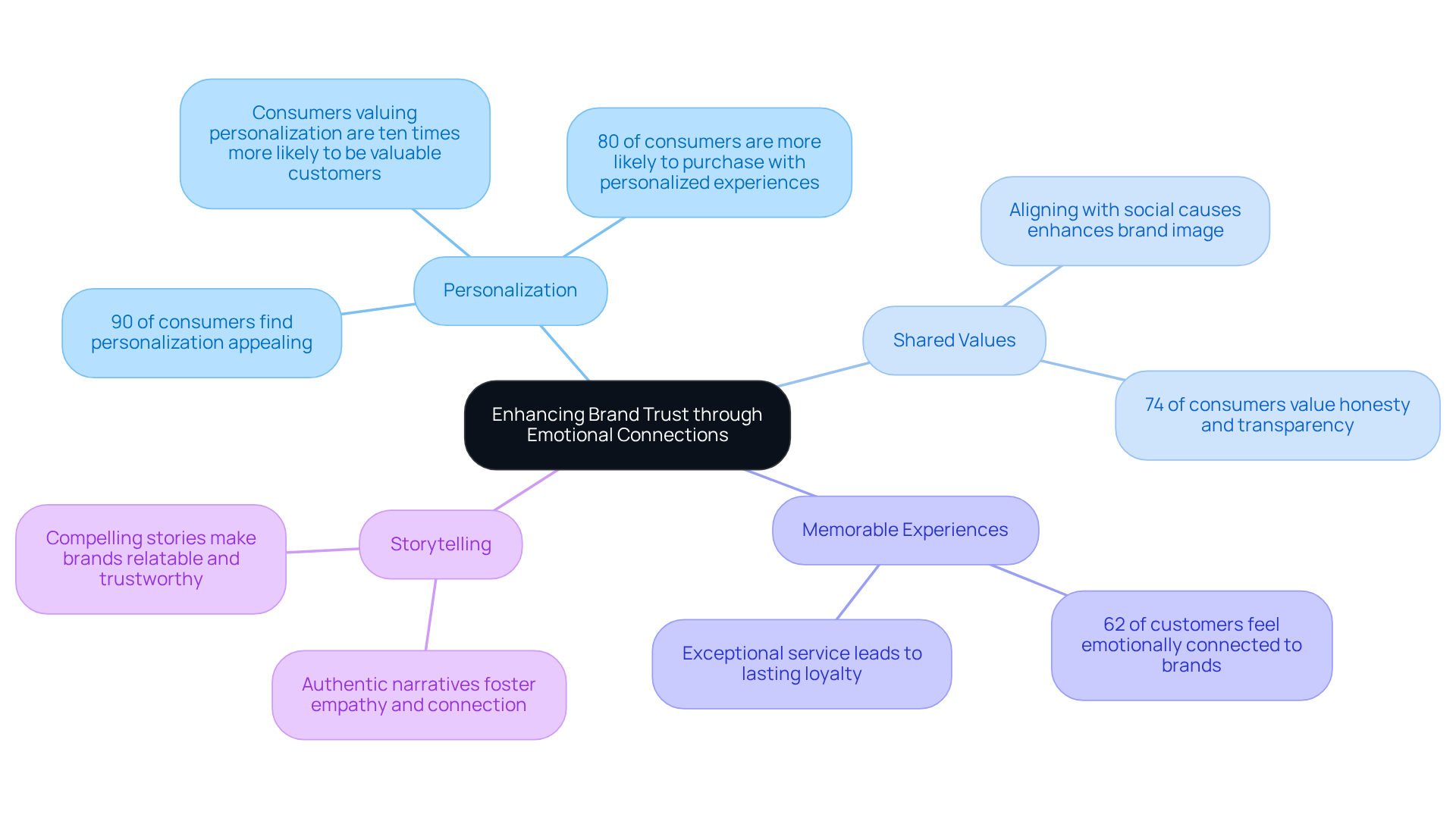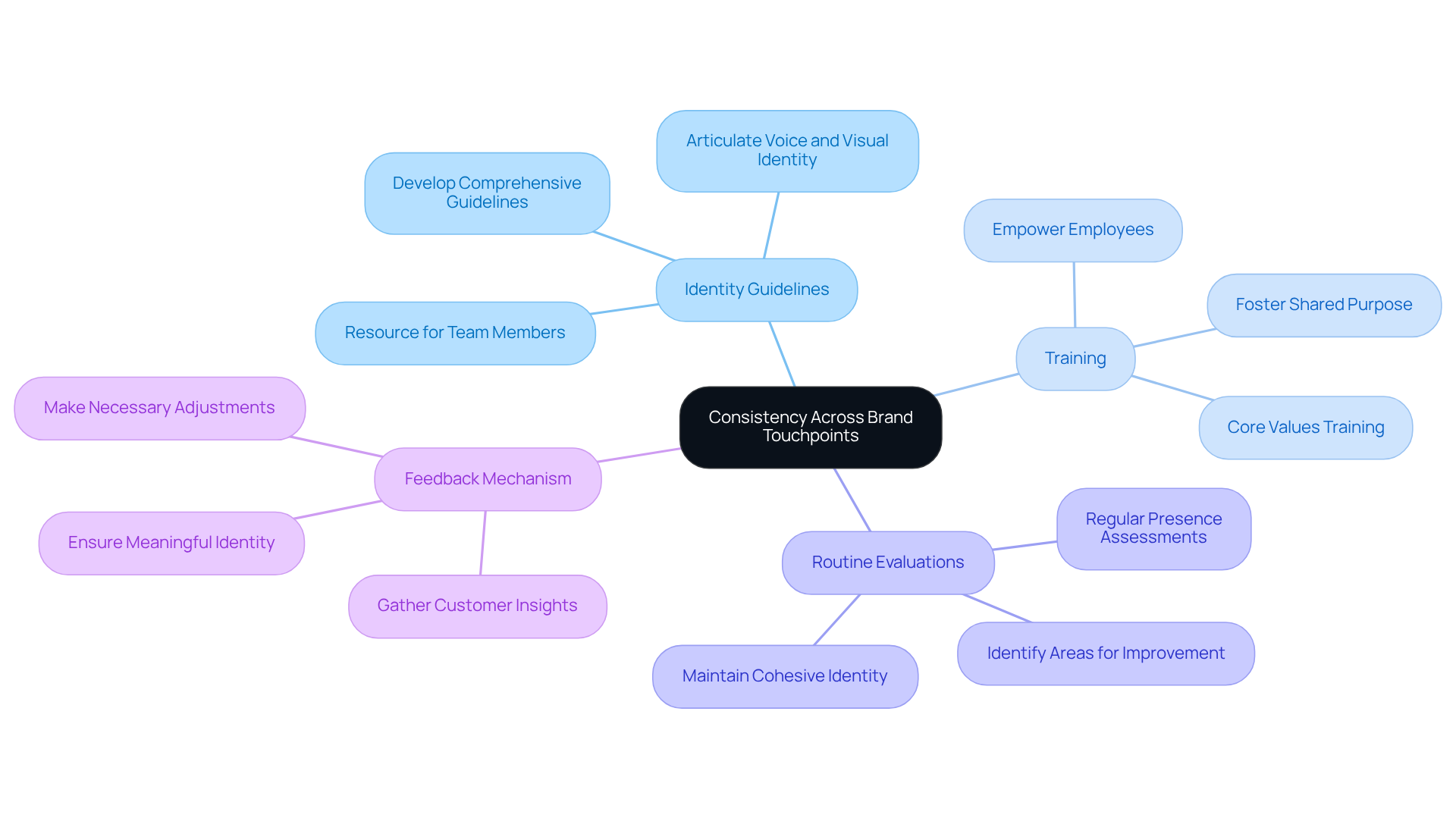Overview
In today's competitive landscape, many brands struggle to connect authentically with their audiences. This disconnect can lead to a lack of trust and loyalty, leaving brands feeling isolated and consumers feeling unvalued. It’s essential to recognize that building trust is not just about transactions; it’s about relationships.
To bridge this gap, there are four strategies for authentic branding that can truly make a difference:
- Transparency
- Engagement
- Consistency
- Storytelling
Each of these strategies serves to align a brand's identity with consumer values, fostering emotional connections that resonate deeply. When brands are transparent, they invite consumers into their journey, creating a sense of belonging. Engagement allows for meaningful interactions, while consistency ensures that these connections remain strong across all platforms.
Moreover, storytelling weaves these elements together, allowing brands to share their unique narratives and experiences. This approach not only enhances customer loyalty but also builds a foundation of trust that can withstand the test of time.
By embracing these strategies, brands can cultivate a nurturing environment that values their consumers, ultimately leading to stronger relationships and a more cohesive presence in the market. Let’s explore how you can implement these strategies to foster a deeper connection with your audience and create a brand that truly resonates.
Introduction
In a time when consumer trust holds immense importance, the role of authentic branding is critical. Tech startups face the challenge of standing out in a crowded marketplace, where aligning values, actions, and communications is essential for building credibility and loyalty. This article explores four key strategies that not only nurture authenticity but also foster deep emotional connections with audiences.
How can companies genuinely express their identity while maintaining consistency across all interactions, and what positive effects does this have on consumer trust? Together, let's navigate these vital questions with care and understanding.
Understand the Importance of Authenticity in Branding
In today's competitive landscape, authentic branding in marketing has become a pressing concern for many tech startup founders. The challenge lies in ensuring that an entity's values, actions, and communications align seamlessly. As consumers grow increasingly selective, they gravitate towards companies that embody openness and authenticity. It's noteworthy that 81% of shoppers express the need for trust in a label before making a purchase. This statistic highlights just how critical authenticity is in shaping buying behavior.
Brands that embrace authentic branding not only attract clients but also cultivate long-term loyalty by resonating with their audience's values and beliefs. For instance, a remarkable 88% of consumers prioritize authenticity when selecting companies, emphasizing that a sincere approach can profoundly impact purchasing decisions. In a crowded marketplace, authentic branding emerges as a vital differentiator for technology startups striving to carve out a meaningful online presence.
By fostering emotional connections, companies that prioritize authenticity can enhance customer loyalty and support, paving the way for sustainable growth. Moreover, maintaining a consistent identity across various platforms can lead to revenue increases of up to 23%. This serves as a practical takeaway for tech startup founders eager to incorporate authentic branding into their strategies.
At RNO1, we understand these challenges and are here to support you. Our performance marketing expertise empowers modern founders to refine their identities, ensuring they resonate deeply with their audience. Together, we can navigate the complexities of establishing a genuine brand presence, fostering not just trust but a thriving community around your startup.
Implement Strategies for Cultivating Brand Authenticity
To cultivate authentic branding, organizations often face the challenge of articulating their core beliefs. This lack of clarity can lead to confusion and mistrust among audiences. To address this, it’s essential to outline your fundamental beliefs and ensure that all communication aligns with these principles. Here are some nurturing strategies to consider:
- Transparency: Openly share your organization's story, mission, and values with your audience. This approach builds trust and demonstrates that you have nothing to hide.
- Engagement: Actively engage with your audience through social media and other platforms. Listening to their feedback and integrating it into your marketing strategy shows that you value their input and fosters a deeper connection.
- Consistency: Strive for uniformity in your organization's voice and messaging across all channels. This consistency not only strengthens your identity but also plays a crucial role in authentic branding by helping individuals recognize and trust your brand.
- Storytelling: Embrace the power of storytelling to share your organization's journey and values. Authentic branding through narratives resonates more with consumers, fostering emotional connections that can lead to lasting relationships.
By implementing these strategies, you can foster a genuine identity that resonates with your audience and builds a supportive community around your organization.
Foster Emotional Connections to Enhance Brand Trust
Emotional connections are vital for building trust in a product, and personalization significantly contributes to this journey. By tailoring messages and services to meet the unique needs and desires of clients, companies can enhance emotional engagement. Research indicates that 90% of people find customization appealing across various sectors, including grocery and travel, and those who appreciate personalized experiences are ten times more likely to become a brand's most valuable customers.
To nurture these connections, brands can embrace several strategies:
- Personalization: Customize your interactions to resonate with individual preferences. This approach not only meets client expectations but also fosters loyalty, as 80% of consumers are more likely to make a purchase when companies offer personalized experiences across diverse sectors.
- Shared Values: Align your identity with social causes that resonate with your audience. This alignment not only enhances your organization’s image but also supports authentic branding by cultivating a community centered on shared values, deepening loyalty among patrons.
- Memorable Experiences: Create interactions that spark positive emotions. Exceptional customer service and engaging content can lead to lasting loyalty, as 62% of customers report feeling emotionally connected to the brands they purchase from, a bond often strengthened through personalized experiences.
- Storytelling: Share authentic narratives that embody your identity's values and mission. Compelling stories can foster empathy and connection, which contributes to authentic branding, making your brand more relatable and trustworthy.
However, while implementing these strategies, companies should remain mindful of potential pitfalls, such as over-personalization or misalignment with consumer expectations, which can alienate audiences. By thoughtfully navigating these challenges and focusing on personalization, companies can enhance emotional engagement, fostering increased customer loyalty and trust.

Ensure Consistency Across All Brand Touchpoints
Inconsistency across your company's touchpoints can create a barrier to authentic branding, trust, and recognition. This challenge not only affects how your brand is perceived but also impacts the emotional connection you establish with your audience, making authentic branding essential. When your identity is unclear, it can lead to confusion and disengagement, making potential customers feel uncertain about who you are and what you stand for, highlighting the need for authentic branding.
To navigate this challenge, consider implementing a few key practices that can foster consistency in your identity:
-
Identity Guidelines: Start by developing comprehensive identity guidelines that articulate your organization's voice, visual identity, and messaging. This document should be a resource for all team members, ensuring everyone understands and embodies your brand's essence.
-
Training: It's vital to provide training for your employees on your core values and messaging. This not only empowers them to represent your identity consistently but also fosters a shared sense of purpose within your team.
-
Routine Evaluations: Regular evaluations of your company's presence across all channels can help ensure alignment with your guidelines. This practice allows you to identify areas for improvement and maintain a cohesive identity that resonates with your audience.
-
Feedback Mechanism: Lastly, implementing a feedback mechanism can be invaluable. Gathering insights from customers about their experiences with your brand can guide you in making necessary adjustments, ensuring that your identity remains consistent and meaningful.
By embracing these practices, you can cultivate authentic branding that builds trust and fosters lasting connections with your audience.

Conclusion
Authentic branding is no longer just a trend; it has become a vital foundation for successful marketing strategies among tech startups. Many founders struggle to connect with their audience in an increasingly skeptical consumer landscape. Establishing a genuine brand presence can bridge this gap, fostering trust and loyalty. By aligning values, actions, and communications, companies can attract customers and cultivate lasting relationships that enhance their market position.
The article highlights key strategies essential for nurturing authentic branding:
- Transparency
- Engagement
- Consistency
- Storytelling
These are crucial elements that help organizations articulate their core beliefs and connect with consumers on an emotional level. Furthermore, personalization and shared values significantly enhance brand trust, showing that a thoughtful approach to customer interactions can lead to increased loyalty and advocacy.
Ultimately, the importance of authentic branding transcends mere marketing tactics; it signifies a fundamental shift in how businesses relate to their audiences. By prioritizing authenticity, tech startups can differentiate themselves in a crowded market while building a supportive community around their brand. Embracing these strategies is crucial for any organization aiming to thrive in today's competitive environment, as authenticity is the key to fostering trust and driving sustainable growth. We invite you to reflect on your own experiences and consider how these insights can guide your branding journey.
Frequently Asked Questions
Why is authenticity important in branding for tech startups?
Authenticity is crucial in branding for tech startups because it helps align a company's values, actions, and communications, attracting consumers who prioritize trust and openness. As shoppers become more selective, authentic branding serves as a vital differentiator in a crowded marketplace.
What percentage of consumers prioritize authenticity when choosing companies?
A remarkable 88% of consumers prioritize authenticity when selecting companies, indicating that a sincere approach can significantly influence purchasing decisions.
How does authentic branding impact customer loyalty?
Companies that prioritize authenticity foster emotional connections with their audience, which enhances customer loyalty and support, ultimately paving the way for sustainable growth.
What is the potential revenue increase from maintaining a consistent brand identity?
Maintaining a consistent identity across various platforms can lead to revenue increases of up to 23%, highlighting the importance of authentic branding strategies.
How can RNO1 assist tech startup founders with authentic branding?
RNO1 offers performance marketing expertise to help modern founders refine their identities, ensuring they resonate deeply with their audience and navigate the complexities of establishing a genuine brand presence.




